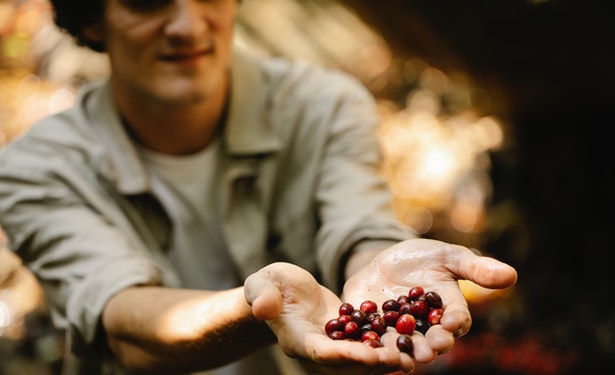Depression: Foods that Boost Mood and Energy
Date: Thursday 06 Jan 2022
When we’re depressed, eating ‘properly’ is often the last thing on our minds. Food is simply fuel – another item on an overwhelming to-do list of things that must be done, or a source of short-lived comfort.
BY BLURT TEAM
And yet, the foods we eat play a vital role in both our physical and our psychological health. Making positive nutritional choices can make a real difference to our overall wellbeing.

Healthy Eating
There are a lot of conflicting messages out there about what is meant by healthy eating: traditionally, the focus was on limiting calories, then came the low-carb high-protein trend, and now there are innumerable health gurus out there singing the praises of spirulina and kale smoothies.
In the podcast on The Role Food Plays in our Mental Health, award-winning dietician Lucy Jones warns us against getting too caught up in such “food fashions”. Eating healthily needn’t be complicated, overwhelming or costly.
Instead we should focus on regularly consuming a variety of nutrient-rich, wholesome foods from the groups we list below. As a rule, the less processed our food, the better.
Improving our diet won’t reap instant results, but consistently eating good quality foods WILL lead to an improvement in mental function, mood and energy levels – which, in turn, can lessen the impact of depression.
Foods that help
The Association of British Dietitians recommends that to help boost mood and energy, our diets should principally be made up of the following types of food:
1. Fats
Yes you read that right: fat is our friend!
Our brains are made of around 40% fat, and we need an adequate supply of it to maintain good health.
However, before we crack open the cream cakes we should note it is unsaturated fat – found in foods like olive or rapeseed oil, nuts, seeds and avocados – that we need to be eating. Trans fats – the fats found in processed foods like sausages, ready meals, or pre-packed cakes and biscuits – may in fact harm brain structure and function.
In addition, Essential Fatty Acids – the “Omega 3 oils” – have been been shown in several studies to help improve mood and reduce depressive symptoms.
The best sources of essential fatty acids are oily fish like salmon, mackerel, herring, sardines, pilchards and trout (fresh, tinned or frozen) – we should aim to eat a couple of portions a week.
If you don’t like fish or are vegetarian, essentially fatty acids can also be found in flaxseed and walnuts, as well as omega 3 fortified foods (look out for fortified eggs and fishfingers). Alternatively you may wish to consider taking a supplement.
2. Wholegrains, Fruit & Veg
The best food is whole food – food in its most natural state.
Wholegrain cereals, beans, lentils, nuts, seeds, fruits and vegetables are enormously good for us. They’re full of fibre, and provide the vitamins and minerals our bodies need to function well.
Complex carbohydrates (found in oats, grains, brown rice and veg like squash) release serotonin in the brain, while B vitamins (including folate) and zinc have been found to be particularly useful in managing depression. You can get these vitamins via a range of wholefoods (as the NHS outlines), or by eating food like marmite and fortified breakfast cereals.
We should be aiming to eat at least five different fruits and vegetables daily to get all the vitamins and minerals we need. If this feels overwhelming – or the idea of chopping up loads of vegetables when you can barely get out of bed feels a bit much – remember this is a target we can work towards, and that there are ‘convenient’ options out there, like fruit smoothies, pre-prepared salads and frozen veg.
3. Protein
Protein is required for our bodies’ growth, maintenance and repair; a lack of protein in our diets can lead to irritability, fatigue, lack of concentration.
Moreoever, some studies have shown that tryptophan – one of the building blocks of protein – can improve the mood of people with depression.
Most people correctly associate animal-derived food – meat, fish, shellfish, eggs and dairy products – as rich in protein; however plant-based foods like lentils, beans, nuts and seeds, as well as some vegetables (such soy beans, peas and broccoli) are also good sources of protein.
Iron deficiency – or anaemia – can also have a affect your mood and energy levels, so it’s important to eat foods that contain iron. Red meat is the most effective source of iron, but you can also get it by eating plant proteins like beans and lentils, as well as dried apricots, dark chocolate (yum!) and fortified breakfast cereals.
4. Water
Although not technically a food, water plays a huge role in our brain function.
The European Food Safety Authority recommends we drink around 2 litres of water a day (you can find out the precise amount you need using the Hydration 4 Health calculator).
Not drinking enough water affects our concentration, our memory and learning ability; even the slightest case of dehydration can have a negative impact on our mood.
Foods that hinder
At Blurt, we don’t believe in denial (we have enough difficulties in our lives without adding to them!), but there are some foods we should seek to limit due to their low nutritional content and the affects they have on our system.
Caffeine and Alcohol are both dehydrating – especially when drunk in large quantities – and can disrupt our sleep patterns. Caffeine withdrawal symptoms can make us feel anxious, irritable and low, and drinking too much can deplete our iron and calcium levels. Drinking too much alcohol comes with its own host of problems, including the depletion of B vitamins, which again leads to low mood.
Sugar is another food we should avoid consuming in large quantities. Eating lots of sugar spikes our blood sugar levels, which leads to feelings of fatigue and irritability when our glucose drops (ever heard the phrase “sugar coma”?). Again, too much sugar has also been linked to depression as the body uses up essential B Vitamins to process the sugar into energy.
Although undoubtedly convenient, most processed foods (foods that come pre-prepared in packages, like ready meals or biscuits) have limited nutritional value. Eat as many fresh foods as possible to supply your brain with the micronutrients it needs to function properly.
We are not suggesting you cut these foods out of your diet completely (we like a cup of tea and a french fancy as much as the next person!), but they should be consumed in moderation, alongside more brain-boosting treats.
Wellbeing boosters
As well as eating a wide range of healthy foods, there are a few other things we can do maximise our wellbeing.
Eat regularly
Although what we eat is important, when we eat is even more crucial for our wellbeing. Eating little and often is the name of the game. As Lucy Jones explains in our food podcast:
“The first thing to think about, rather than the specific foods that we should be eating, is the way we should be eating. Eating a regular meal pattern can play a big role in improving energy levels, brain function, concentration and ability to remember things.
Actually getting up and getting into a regular meal pattern through the day gives your brain a constant supply of energy from the food that you eat. We know that long periods of fasting can actually negatively affect our mood and our energy levels leaving people sort of distracted and less productive through the day”.
Consider supplements
Although a varied diet can supply our bodies with all the goodness it needs, in some cases a nutritional supplement may be helpful. As the BDA outlines:
If you have not been eating well recently, or rely on ready meals and packaged foods regularly, you may be lacking certain vitamins and minerals. If you smoke or drink too much alcohol you may also need extra nutrients.
If so, you may want to take a one-a-day complete multivitamin and mineral supplement. These contain a full range of all the essential nutrients. Choose one that contains 100% of recommended daily intakes. Very high dose supplements (more than 100%) are not more effective than these and just cost extra money. They may even cause an increased risk of ill health. Vitamin A and E supplements in particular are not recommended for smokers.
Recent research has also shown that folate (one of the B vitamins) supplements may increase the effectiveness of antidepressant medication. If you are thinking about taking any additional nutrient supplements ask your doctor for advice.
Be good to yourself
While eating healthily can help calm depressive symptoms, making radical lifestyle changes can be daunting, especially when we’re in the depths of depression.
If reading this post has inspired you to improve your diet, remember you don’t need to overhaul everything all at once. You can start small: maybe by ensuring you eat one piece of fruit a day, and then – when that becomes a habit – introducing another.
Celebrate your successes – however small – but don’t berate yourself for ‘slip-ups’. Remember the motivation behind eating healthily is feeling good. If being mindful your diet leaves you feeling ‘bad’ or dispirited or guilty, shift your focus elsewhere: depression gives us a hard enough time as it is. Your wellbeing is what is most important.
Sharing is caring: please share this post to help others, you never know who might need it.
Content source: https://www.blurtitout.org/2016/03/02/depression-foods-that-boost-mood-and-energy/

